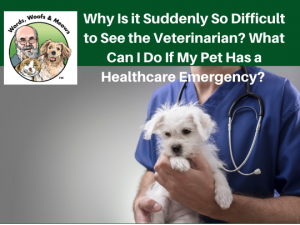 < A version of this article was published in the NOV2021 issue of Downeast Dog News>
< A version of this article was published in the NOV2021 issue of Downeast Dog News>
< Updated 01NOV21 >
< A short link for this page – https://bit.ly/2021VetCrisis >
Some of my clients have commented on the long lead times to get appointments with their veterinarian for several months. In addition, new clients that have just moved to the area have indicated that many local veterinarians are not accepting new patients at this time. There were also rumors of the Eastern Maine Emergency Veterinary Clinic (EMEVC) not being open some nights and turning patients away because they did not have enough staff to see everyone. So, on Sept. 27, When EMEVC announced that they would be closed on Mondays and Tuesdays until further notice, I started to ask my friends in the veterinary community what was going on. What I learned was alarming.
After talking with colleagues throughout Maine and the USA, I discovered a nationwide shortage of veterinarians, technicians, and assistants. The American Veterinary Medical Association (AVMA) recently addressed this topic in an article in the JAVMA News entitled “Are we in a veterinary workforce crisis?” While some have speculated that this was due to a massive increase in pet adoptions due to the COVID-19 pandemic, the data reported in JAVMA does not support this conclusion; “The number of pets adopted from shelters in 2020 was the lowest in five years, based on data from over 4,000 shelters across the country.”
The data does indicate “…veterinarians saw fewer patients per hour and average productivity declined by almost 25% in 2020, compared with 2019.” The JAVMA News article suggests a significant drop in productivity directly resulting from necessary changes in how veterinary practices operated due to the COVID-19 pandemic. As with other professions, the pandemic has increased stress levels and a loss of staff due to illness, a need to care for family members, or burnout.
The article in JAMA News suggests several things the veterinary profession can do to change this situation, but none will happen quickly. Additionally, society is still feeling the effects of COVID-19. With cases increasing again, it is quite possible things will worsen before they get better.
Those who share our lives with pets care deeply about their health, as does the entire veterinary and professional pet care community. I believe the best thing we can do as a like-minded community is to commit to working together to resolve this crisis. Too many people have used COVID to divide us as a society; it’s time for pet guardians to set an example for the rest of the world. Let’s show the world how to work together as a compassionate, caring team that is as concerned about the wellbeing of others as much as themselves. This is how we can start:
- Be kind, patient, and helpful to others.
- If you have not already done so, establish a relationship with a local veterinarian. Ask them what level of care they can provide if area emergency clinics are unavailable BEFORE you have an emergency.
- Ensure you have contact information for all area emergency clinics readily available if the closest is closed.
- Take a pet first aid class to better prepare to care for your pet in a crisis. An excellent course is offered online by the Pet Professional Guild. [ FMI – https://www.petprofessionalguild.com/Learnpetfirstaid ]
- Keep all of your pet’s veterinary records so that they are readily available if you need to see another veterinarian. Take those records with you if you travel with your pet.
- Every time you see your veterinarian, they probably send you home with a report indicating when your pets will be due for their next vaccinations and exams. Don’t wait until the last minute to schedule those appointments. Also, keep that information readily available so that you can provide it to your daycare, boarding facility, dog trainer, and groomer without having to call your very busy veterinarian for another copy.
- Keep your pets healthy. Make sure that they have adequate and appropriate physical exercise and mental enrichment. Feed them healthy food and do not let them become obese. Provide them with medications as prescribed and order prescription refills well in advance. Please, do not use aversive training tools [ shock, prong & choke collars] that can cause physical or emotional injury.
- Before embarking on a non-regular activity with your pet, assess their health and age and review the risk of that activity. Is your pet up to it, and are you ready to do what’s necessary if your pet has a healthcare emergency?
- Be kind, patient, and helpful to others.
References
Are we in a veterinary workforce crisis?, JAVMAnews, Sept. 15, 2021 – https://www.avma.org/javma-news/2021-09-15/are-we-veterinary-workforce-crisis
________________________________________________________________________
Don Hanson is the co-owner of the Green Acres Kennel Shop ( greenacreskennel.com ) in Bangor, Maine, where he has been helping people with their pets since 1995. He is also the founder of ForceFreePets.com, an online educational resource for people with dogs and cats. Don is a Bach Foundation Registered Animal Practitioner (BFRAP), Certified Dog Behavior Consultant (CDBC), Associate Certified Cat Behavior Consultant (ACCBC), and a Certified Professional Dog Trainer (CPDT-KA). He is a member of the Pet Professional Guild (PPG), where he serves on the Board of Directors and Steering Committee and chairs the Advocacy Committee and The Shock-Free Coalition ( shockfree.org ). Don produces and co-hosts a weekly radio show and podcast, The Woof Meow Show, that airs on Z62 Retro Radio WZON (AM620) and WKIT 103.3-HD3 and is streamed at http://bit.ly/AM620-WZON every Saturday at 9 AM. Podcasts of the show are available at http://bit.ly/WfMwPodcasts/, the Apple Podcast app, and Don’s blog: www.words-woofs-meows.com. The opinions in this post are those of Don Hanson.
©31@OCT21, Donald J. Hanson, All Rights Reserved
< Click for Copyright and Use Policy >